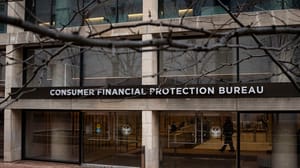Acting SEC Chairman Pauses Legal Defense of Climate RuleActing SEC Chairman Pauses Legal Defense of Climate Rule
Acting SEC Chair Mark Uyeda cited his concerns about the rule, the change in the commission’s composition and President Donald's Trump’s order on a regulatory freeze. Commissioner Caroline Crenshaw argued what’s changed has been “matters of politics, not substance.”

Acting SEC Chair Mark Uyeda is pausing the commission’s defense of its climate disclosure rule, asking a federal appeals court to hold off on scheduling arguments while the regulator weighs its options.
However, the SEC’s lone Democratic commissioner argued that the only changes since the rule’s passage have been “matters of politics, not substance.”
The commission initially passed the “Enhancement and Standardization of Climate-Related Disclosures for Investors” in March 2024, creating federal requirements for companies to discuss risks and opportunities climate change poses to their structure (while also purportedly helping investors compare companies on how they’re navigating climate change).
Industry advocates and environmentalists criticized the rule; the former accused the commission of pushing its remit beyond securities regulation into climate issues, while the latter argued the SEC had drastically watered down the final rule from an earlier version.
In April of last year, the SEC temporarily froze the rule as it faced several court challenges, which were eventually consolidated into a case before the Eighth Circuit.
In his statement Tuesday morning, Uyeda argued that the rule was “deeply flawed” and could inflict “significant harm” on markets and the economy. He noted that he and fellow Republican Commissioner Hester Peirce voted against adopting the rule in March of last year, with Peirce arguing that already-existing disclosure rules were sufficient.
According to Uyeda, the briefs the SEC previously filed defending the rule (during prior Chair Gary Gensler’s tenure) did not reflect Uyeda’s views.
“The briefs defend the commission’s adoption of the rule, but I continue to question the statutory authority of the commission to adopt the rule, the need for the rule and the evaluation of costs and benefits,” he wrote. “I also question whether the agency followed the proper procedures under the Administrative Procedure Act to adopt the rule.”
Uyeda also cited President Donald Trump’s executive order mandating a freeze on all regulation and “the recent change in the composition of the commission.” With the departures of Chair Gary Gensler and Democratic Commission Jamie Lizárraga, the SEC currently is made up of Republican Commissioners Peirce and Uyeda, as well as Democratic Commissioner Caroline Crenshaw.
Uyeda asked the court to pause any scheduling so the commission “can deliberate and determinate the appropriate next steps in these cases.”
However, Crenshaw responded with her own statement, arguing that Uyeda acted “unilaterally” without the input of the full commission.
In response to Uyeda’s arguments, Crenshaw returned to her original defense of the climate disclosure rule, noting the SEC is not an environmental agency but does require public companies to disclose risks, having done so “myriad times” without its authority to do so questioned.
Crenshaw also argued that none of the developments Uyeda cited (including the regulatory freeze and the change in the commission’s composition) impacted the merits of the SEC’s case, “which was fully briefed months ago.”
“If, as it appears to be, the acting chairman’s true intent is to constructively deauthorize the commission’s pursuit of the appeal to align with his policy preferences, then his statement is an end-run around commission authority,” Crenshaw wrote.
According to Mark Quinn, the director of regulatory affairs at Cetera Financial Group, Uyeda’s decision was “interesting on a lot of levels,” regardless of one’s opinion on the climate rule itself.
He said Uyeda’s approach raises the question of whether agencies (and their chairs) can unilaterally “decide to abrogate or refuse to endorse rules that have been previously adopted.”
While the climate disclosure rule has already been stayed, there are others still in effect. According to Quinn, Uyeda may be “effectively withdrawing” the climate rule without going through the usual process to do so.
“Agencies make decisions about what to emphasize and where to utilize their resources all the time,” he said. “That is the essence of what they do, but this may be a little different.”







